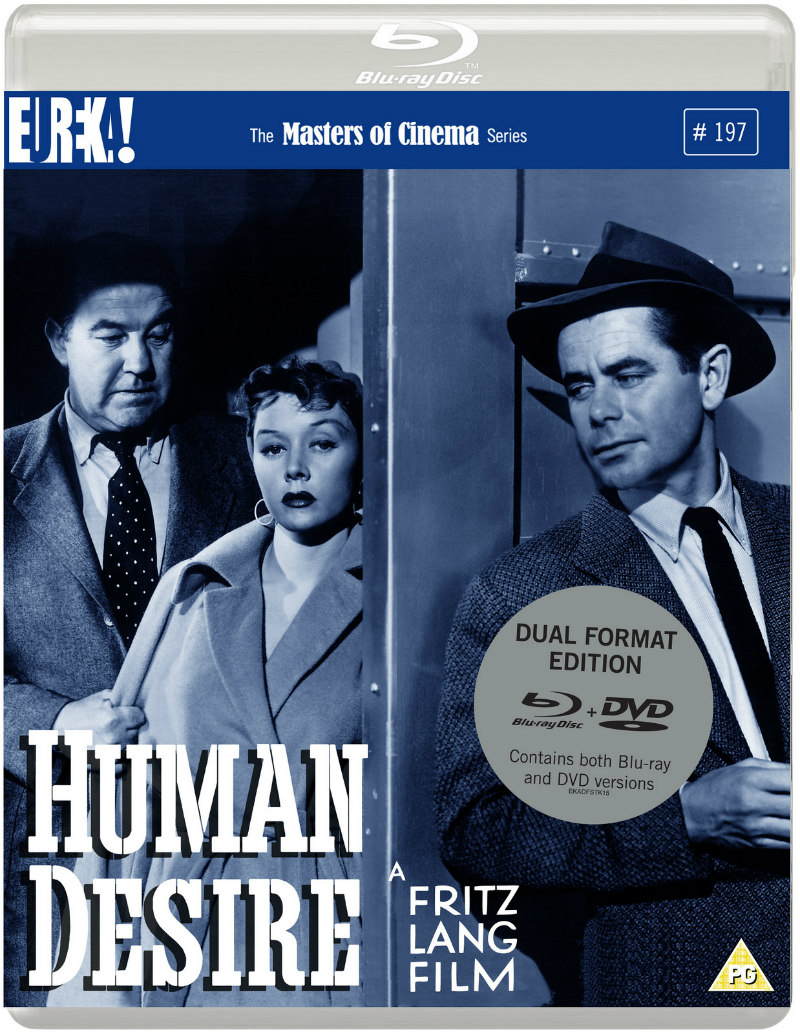
Review by Eric Hillis
Directed by: Fritz Lang
Starring: Glenn Ford, Gloria Grahame, Broderick Crawford, Edgar Buchanan, Kathleen Case

French author Émile Zola's 1890 novel 'La Bête humaine' has been adapted for the screen multiple times. The novel was filmed in Germany in 1920 (Ludwig Wolff's Die Bestie im Menschen), in Argentina in 1957 (Daniel Tinayre's La Bestia humana) and Britain in 1995 (Malcolm McKay's Cruel Train), but the most acclaimed adaptation is Jean Renoir's 1938 film, which maintains Zola's original title but considerably tinkers with its storyline. Fritz Lang's 1954 thriller Human Desire credits Zola's novel as its source, but has more in common with Renoir's film than the original text.
Of course, Hollywood filmmakers of the '50s were under far more censorious restrictions than their Gallic counterparts of the '30s, and so the morally grey areas of both Zola's novel and Renoir's film are made considerably more black and white. Gone is the psychopathic, sexually perverted protagonist played by the menacing Jean Gabin in the '38 film. In his place is an outwardly clean cut returning war hero, Glenn Ford's Jeff Warren, an affable train driver who takes lodging with the family of an older colleague, Alec Simmons (Edgar Buchanan).

Meanwhile, Jeff's co-worker Carl Buckley (Broderick Crawford) is fired from his supervisor job following a confrontation with the railroad foreman. An alcoholic with a short temper, Carl is somewhat unfeasibly married to the younger Vicki (Gloria Grahame), whom he asks to plead his case with John Owens (Grandon Rhodes), a wealthy railroad customer who once employed Vicki's mother as a housekeeper. Vicki is reluctant at first, but gives in to her domineering husband's pressure. When Vicki spends most of the afternoon with Owens, Carl grows suspicious, and using the threat of physical violence, forces his wife to confess that she may have gone to extra lengths to win her husband's job back. Consumed with rage, Carl sets up Owens for a false rendezvous with Vicki and murders him on the evening train, disguising it as a mugging by stealing his wallet.
Thrust unwittingly into this scenario is Jeff, who just happens to be hitching a free ride home and is blocking Carl's way back to his compartment. Carl once again asks his wife to use her feminine wiles, this time to distract Jeff. While Vicki chats seductively with Jeff, he wastes no time in shoving his tongue down her throat, and it's not long before the pair are engaged in an affair, with Vicki hoping to convince her new lover to kill her husband.

Ford's Jeff may not be the outright ne'er do well of Zola's novel and Renoir's film, but for a 1954 Hollywood production he's still a rather risqué protagonist, not one American audiences would have easily sympathised with at the time, or even today. When Vicki bares her shoulder to reveal bruising from her husband's man-handling, rather than confronting Carl about his abusive ways, Jeff instead takes this as a means of justifying his affair with Vicki. As is often the case with films noir, Grahame's fair-haired femme fatale is juxtaposed with an innocent brunette, Alec's daughter Ellen (Kathleen Case), who has grown into womanhood while Jeff was fighting in Korea, and is smitten with the handsome train driver. She represents everything Vicki doesn't - security, comfort, home-cooked meals - but Jeff coldly brushes her off, sending her fleeing his room in tears in the movie's most emotional scene. Men, huh?
Yet Jeff is the closest Lang's film has to a hero, while Vicki, though a victim of the physical abuse of both Owens and Carl, is rendered as the story's antagonist through her manipulation of Jeff towards offing her hubby. Conversely, Carl, who has actually killed a man and has subjected his wife to years of abuse, is oddly portrayed as a pathetic schlub whom Lang and scriptwriter Alfred Hayes refuse to demonise.

It's this twisted dynamic that makes Human Desire one of Lang's most fascinating films while being far from his greatest. There's nothing likeable or positive about Carl, but watching him shamble drunkenly while his would-be killer Jeff follows him in the shadows of the train yard, it becomes difficult to egg on his murder. Crawford's Carl has as much in common with the pitiful protagonists played by Edward G. Robinson in Lang's superior noirs Scarlet Street and The Woman in the Window than with the thuggish villains Dan Duryea essays in those pictures.
Thanks to this curious moral positioning of its three leads, the film climaxes with all three getting an ending none of them deserve, making Human Desire ultimately as perverse in its American puritanism as the French novel and film it draws from were in their Gallic greyness.

Extras:
Original trailer; interview with film scholar Tony Rayns; booklet featuring new writing on the film alongside rare archival imagery.

Human Desire is on dual format blu-ray/DVD from Eureka Entertainment now.
